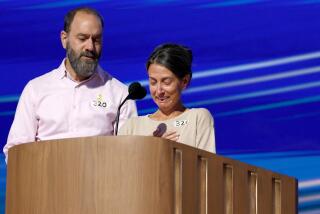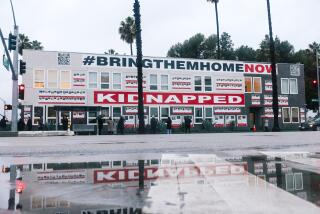Former Hostages and ‘Shields’ Back Bush : Lobbying: Group is in capital to counter what is called misconceptions.
- Share via
WASHINGTON — A delegation of former hostages and “human shields” is lobbying Congress in support of President Bush’s action in the Persian Gulf, offering eyewitness accounts to counter what they fear are misperceptions.
For one thing, they would like to convince Congress that sanctions are not likely to force Iraq out of Kuwait.
“Food is being used as a double-edged sword. The shelves in Baghdad are full but families in Kuwait are almost starving,” said Todd Davis, 42, a bank manager from Banning, Calif., who was hidden by Kuwaiti friends until he was evacuated in mid-December.
Second, the delegation is emphasizing the bravery of the many Kuwaitis who put their lives on the line to protect Americans. Davis cited the case of a family with three young children shot for hiding a Westerner.
“At night the Kuwaitis go to the rooftops and wail ‘God help us,’ ‘The United States help us,’ ” Davis added. “They think there’s an American satellite out there somewhere. They wail until the Iraqi soldiers shoot above the rooftops. It used to make my wife cry.”
The delegation representing 30 former hostages said that it does not advocate military action in the gulf. But the spokesmen argued that the suffering of the Kuwaiti people must be ended, and they suggested no option short of war.
They urged Congress to authorize the President to use force if Iraq has not left Kuwait by Jan. 15.
“It would be better to attack now before the sandstorms and heat,” said Christopher Fulsom, 51, who was held as a human shield in Iraq. “There would be fewer casualties and it would save Kuwaitis from suffering more.”
The delegation, which has been here since Jan. 4 at their own expense, plans to continue lobbying until Jan. 15, which they call “D-Day.”
“We’ve seen over 100 people from Congress, the Administration and the media and we’re not going to stop until the very end,” said Bennie Mitchell, an engineer from Sandia, Tex., who took refuge at the American Embassy in Kuwait.
The former hostages agreed that they saw nothing to indicate that Saddam Hussein has any intention of quitting Kuwait voluntarily.
“At the embassy we learned that the Iraqis were requiring Kuwaitis to make a 16-hour road trip to Baghdad to get Iraqi identifications to buy food. In other words, they had to renounce their Kuwaiti citizenships just to survive,” said Mitchell, 36.
The group is also telling Congress that they saw low morale within Iraq’s occupation forces and that the troops appeared poorly prepared for war.
“The soldiers receive very little support from their supply line,” said Cecil P. Brown, a systems consultant from Atlanta who was held as a human shield. “In many cases they’re hungry. They certainly don’t get enough to stay in a combat-ready situation.
“Defection is a reality,” Brown added, saying that many soldiers were going to Kuwaiti families begging not only for food but also for clothes so they could shed their uniforms.
More to Read
Sign up for Essential California
The most important California stories and recommendations in your inbox every morning.
You may occasionally receive promotional content from the Los Angeles Times.













